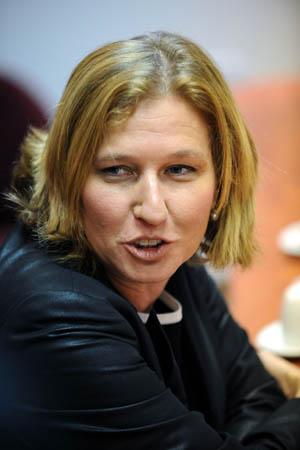Israeli Foreign Minister Tzipi Livni, the new chair of the ruling Kadima party and possibly the new prime minister, vowed Thursday to push forward the peace process, yet analysts cautioned that the odds do not necessary favor her.
With a slim margin of merely 1.1 percentage point, the top Israeli diplomat beat her main rival, Transportation Minister Shaul Mofaz, in the party's primary on Wednesday, and became the third and first woman leader of the three-year-old centrist party.
 |
|
The file photo taken on September 15, 2008 shows Israeli Foreign Minister Tzipi Livni smiling during a meeting with her Spanish counterpart Miguel Angel Moratinos in Tel Aviv, Israel. Final results released by Israel's ruling Kadima party early Thursay showed that Foreign Minister Tzipi Livni won the party's primary, local news service Ynet reported. [Yin Bogu/Xinhua] |
Different from Mofaz, an icon of the relatively right wing of the party, Livni was generally considered more left-wing. She has been leading the Israeli team in negotiations with the Palestinians, and has also expressed her resolve to continue with the talks.
Yet Dahlia Golan, Professor of Government at the Interdisciplinary Center Herzliya, cautioned that Livni's election probably would not make much of a difference to the peace process though it did create more stability on the Israeli side.
"If she succeeds to put together a government, she would have an interest in trying to reach an agreement and in making some progress before elections," Golan told Xinhua, noting that Livni has stressed at various occasions the need for Israel to address the Palestinian quagmire.
However, analysts agreed that Livni's primary objective is domestic as she has at most 42 days to form a new coalition. Should she fail, early general elections would be held, possibly in the spring.
"She has to put together a government" before she can pursue the peace track, Golan said, while stressing that the Palestinian side would also have to be willing and able to negotiate.
Livni has said she would try to preserve the coalition and then expand it, but her coalition partners have already hinted at a tough stance in an attempt to strengthen their bargaining positions.
As far as the peace talks are concerned, leaders of current coalition party Shas have claimed that they would not be able to sit in a government that supports concessions on the issue of Jerusalem, which Israel unilaterally claims as its permanent capital.
The Jerusalem question is one of the core issues dividing Israel and the Palestinians, who hope to establish a capital for their future state in the east part of the holy city, including the Old City, home to the holiest Jewish site, the Western Wall, and the third holiest Islamic site, the Al-Aqsa Mosque.
Some analysts believe that if Shas leaves the coalition, Livni's best chance for establishing a coalition which would favor striking a peace agreement with the Palestinians is to pull in the left-wing Meretz party.
Then she could create a coalition comprising Kadima, Labor, Meretz, and the Pensioners Party, which would amount to 60 lawmakers and would probably enjoy the support of the Arab parties from outside of the coalition.
However, Labor Chair and Defense Minister Ehud Barak has voiced opposition to the continuation of the current coalition, and called for the formation of a broad emergency government, which would bring together all main parties, or general elections.
The more hawkish Likud party, led by former Prime Minister Binyamin Netanyahu, who is himself interested in holding early general elections, have firmly ruled out the possibility to join such a coalition. Netanyahu has said that he has no intention of serving in any government other than one led by the Likud.
(Xinhua News Agency September 19, 2008)